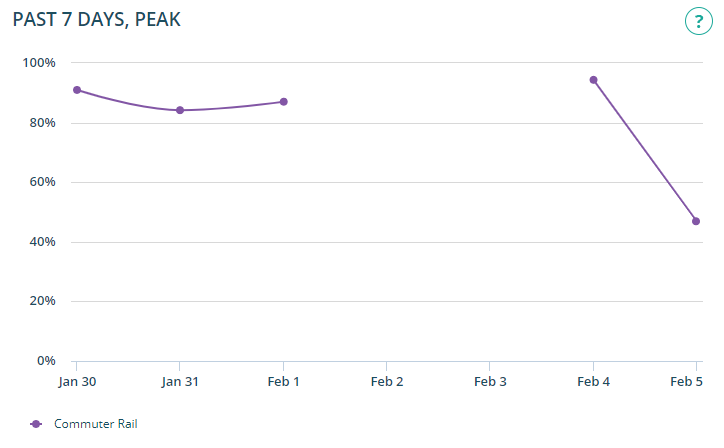After Win Number Six, Transit is Still a Loss
How was your commute yesterday? Odds are, it wasn’t good. Forty-seven percent of February 5th’s peak-hour commuter rail trains (7:00 am to 9:00am and 4:00 pm to 6:30 pm) were late. Your chances of getting to work or home on time were about the same as the Patriots winning the toss and electing to defer.
Monthly commuter rail passes range in price from $84.50 to $398.25. Since the cheapest ($84.50) serves region 1A (most of which is already served by MBTA buses and subways), commuters from further away are usually paying for a service they need. There is no subway or bus they can catch to work. Many don’t have the extra $70 it would take for a one-way Uber/Lyft/taxi ride to work. The MBTA’s fix was to suggest people work from home, if possible, or show up an hour early for their train.
So every year the Patriots win the Super Bowl, people are paying to work from home. Or they’re paying to leave the house an hour earlier and still miss an hour’s wages when trains pass them by:
Online, passengers reported on their Patriots’ Parade MBTA experience with frustrating, worried tones:
While the MBTA was happy to report “record ridership”, others were noting the record ridership was not accompanied by a concomitant rise in fare revenue:
Hopefully these experiences were outliers rather than the norm on the trains.
Patch spoke with a Keolis conductor, who described the day as “embarrassing for the company”. But it doesn’t have to be. Several people have suggested moving victory parades to the weekend, since service is already very limited due to the lack of commuters. There aren’t even “peak hours” during the weekend because ridership is so low:

If the MBTA added extra trains on a Saturday, they might be able to get Patriots fans in and out of the city without creating a nightmare for commuters.
The MBTA has excellent service almost every other day of the year. Ranked as the third best city for public transit in the United States, the T knows what they’re doing. Most other cities don’t have Super Bowl parades often enough to warrant (almost) annual celebrations, so the MBTA has a unique problem. Since the Patriots may well win again next year, hopefully the City of Boston will work with the MBTA to deliver a win for Boston commuters.
Kaila Webb is a Jane & Steven Akin Digital Media Fellow for Pioneer Institute, as well as a third year Wellesley student double majoring in Chinese Language & Culture and Environmental Studies. Her research focuses on health care policy, environmental development, and public transit.



